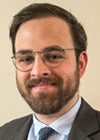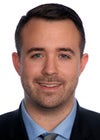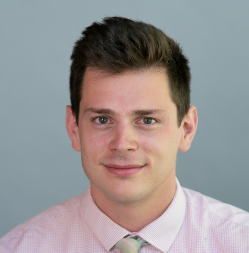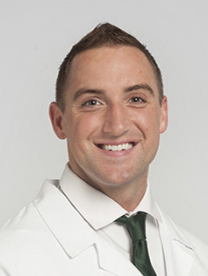Fellowship Match Testimonials
Select below to see what previous residents have to say about how training at UVA helped prepare them for fellowship at top-notch institutions:
The exceptional training and mentorship I received during my internal medicine residency played a pivotal role in securing my desired path into hematology/oncology fellowship.
 During my Internal Medicine residency at UVA, I was fortunate to have experienced an awesome and nurturing environment that profoundly shaped my medical career. The program was designed to challenge and support residents, fostering a strong foundation in various medical specialties, including in Hematology and Oncology. From the very beginning, the faculty and mentors invested in my growth, providing valuable guidance and opportunities for hands-on learning.
During my Internal Medicine residency at UVA, I was fortunate to have experienced an awesome and nurturing environment that profoundly shaped my medical career. The program was designed to challenge and support residents, fostering a strong foundation in various medical specialties, including in Hematology and Oncology. From the very beginning, the faculty and mentors invested in my growth, providing valuable guidance and opportunities for hands-on learning.
Throughout my residency, I was able to actively pursue my passion for Hematology and Oncology, and the program fully supported my aspirations. The diverse patient cases and exposure to cutting-edge treatments allowed me to gain invaluable clinical expertise in managing complex oncological conditions.
The camaraderie and collaborative spirit among residents and faculty created a supportive atmosphere, making the learning experience even more enriching. The exceptional training and mentorship I received during my internal medicine residency played a pivotal role in securing my desired path into hematology oncology fellowship.
Braulio Cuesta, MD, UVA Internal Medicine Residency Class of 2022
I strongly believe that no matter your career aspirations, training in the UVA IM residency program will allow you to grow into a fantastic physician while also allowing for an unrivaled quality of life.
 When I applied to residency, I sought out a program that had it all: friendly co-residents and faculty, a reputation for well-rounded clinical training, a good schedule, an emphasis on wellness, and plentiful academic opportunities. At times it felt like a quest for a “unicorn” residency program. I consider myself lucky to have found everything and more at UVA, and I am incredibly satisfied with the direction I’ve taken in my training. I strongly believe that no matter your career aspirations, training in the UVA IM residency program will allow you to grow into a fantastic physician while also allowing for an unrivaled quality of life.
When I applied to residency, I sought out a program that had it all: friendly co-residents and faculty, a reputation for well-rounded clinical training, a good schedule, an emphasis on wellness, and plentiful academic opportunities. At times it felt like a quest for a “unicorn” residency program. I consider myself lucky to have found everything and more at UVA, and I am incredibly satisfied with the direction I’ve taken in my training. I strongly believe that no matter your career aspirations, training in the UVA IM residency program will allow you to grow into a fantastic physician while also allowing for an unrivaled quality of life.
The UVA IM residency program creates an intentional structure that prioritizes education and challenges
trainees to grow while still offering ample support. Most rotations have a 1:1 resident to intern ratio, which
allows interns to advance over the course of the year and eventually lead the inpatient team. UVA works to
recruit trainees who are smart yet humble, friendly, and down-to-earth. I had such wonderful co-residents that
work almost always felt fun, even during busier and more challenging rotations. The 3+1 schedule provides
exposure to subspecialty clinics from the start of intern year, where relationships with faculty members can be
cultivated early in residency. During second and third year, residents have the option for dedicated research
time every month during the “+1” week. This was instrumental in helping me build a competitive fellowship
application. Plus, I can’t emphasize enough just how great it was to be guaranteed a full weekend off every
month of residency. As a resident, I felt that I had plenty of time to enjoy all the amazing activities that
Charlottesville and the surrounding area has to offer.
When the COVID-19 pandemic began during the spring of my intern year, our program was able to adapt to
new logistical and patient care challenges without jeopardizing our education or time-honored program
traditions. Our leadership worked tirelessly to preserve the quality of our training while taking resident feedback
into account. I felt this was a testament to our program’s successful formula for training residents, combined
with excellent program leadership and the resilience necessary to overcome new challenges.
Scholarly activity is a program requirement, and there are numerous research opportunities at UVA. It’s easy to
find a mentor who will help you cultivate your passion. Each division within the Department of Medicine has
many faculty members engaged in the full spectrum of clinical, translational, and basic science research. UVA
faculty members are universally approachable and excited to collaborate with interested residents. I didn’t
need to look far to find great mentorship in pulmonary medicine, and it wasn’t long before I had identified a
mentor and research projects which laid the groundwork for the academic trajectory I’ve continued as a fellow.
Between my research and clinical mentors, as well as our leaders within the residency program, I had a team
of supporters in my corner who were invested in my success. With their guidance, I was able to match into my
first choice program in pulmonary and critical care medicine. Looking back on my first year of fellowship, I have been extremely pleased with how well my training at UVA prepared me to excel both clinically and
academically in fellowship and beyond. I’m extraordinarily grateful for the experience I had as a resident at UVA, the mentorship I had during residency, and the lifelong friendships I made in the process. I encourage you to consider UVA for your residency training!
James Alsobrooks, MD, UVA Internal Medicine Residency Class of 2022
You will be hard pressed to find an internal medicine residency program that better delivers a foundation in internal medicine training and structured guidance towards subspecialty training than the University of Virginia.
 fairly certain that I wanted to do Pulmonary and Critical Care Medicine. I understood that I would need excellent clinical, research, and mentoring experiences in order to be sure that this was the correct path and to be successful on the interview trail. UVA internal medicine provided all of this and more. The internal medicine training program offers a fantastic foundation in critical care training and a variety of opportunities to learn more about consultative and outpatient pulmonary medicine. Through your clinical rotations and the residency programs multi-tiered mentoring model, I was able to start important mentoring relationships that not only led to research projects but also helped guide me through the process of applying to fellowship. There are conversations that I had with my mentors at UVA that remain sharply etched in my mind because of how instrumental they were in guiding me towards my fellowship training.
fairly certain that I wanted to do Pulmonary and Critical Care Medicine. I understood that I would need excellent clinical, research, and mentoring experiences in order to be sure that this was the correct path and to be successful on the interview trail. UVA internal medicine provided all of this and more. The internal medicine training program offers a fantastic foundation in critical care training and a variety of opportunities to learn more about consultative and outpatient pulmonary medicine. Through your clinical rotations and the residency programs multi-tiered mentoring model, I was able to start important mentoring relationships that not only led to research projects but also helped guide me through the process of applying to fellowship. There are conversations that I had with my mentors at UVA that remain sharply etched in my mind because of how instrumental they were in guiding me towards my fellowship training.Isadore Budnick, MD, UVA Internal Medicine Residency Class of 2021
This is a place where everyone around you will spur you to get the most out of yourself, without a hint of “competitiveness.”

UVA Internal Medicine provided a singular training experience that has positively shaped every aspect of who I am as a physician today and was essential in preparing me for fellowship in Infectious Disease. The program thrives in launching residents in their future careers by creating exceptional general medicine physicians. The breadth of care that UVA residents provide across IM services made me feel comfortable caring for patients within each subspecialty, which has been greatly beneficial during my fellowship in which I see patients with a wide variety of illnesses across all services in the hospital.
Another major strength is how heavily the faculty at UVA invest in resident education and mentorship. This is a true point of emphasis of the program and part of the unique esprit de corps cultivated here, and it is impossible to oversell how the faculty promote the success of the residents. During my time at UVA, I had numerous mentors who were able to guide me through the fellowship application process and who continue to be amazing resources for me as I prepare for a career in academic medicine.
Finally (but most importantly), the residents themselves create a special atmosphere of shared success and motivation. This is a place where everyone around you will spur you to get the most out of yourself, yet without a hint of “competitiveness”. The residents nurture each others’ academic and professional success while providing a secure and supportive environment that forges bonds lasting far beyond your time in residency. As a fellow, I hearken back frequently to my time at UVA , and truly cannot imagine a better program to have prepared me for fellowship and my future career.
Alex Zimmet, UVA Internal Medicine Residency Class of 2020
If you are looking for a highly collegial, clinically challenging, and well-designed internal medicine program which will overprepare you for any fellowship in the country, it’s hard to find better people and a better place than the University of Virginia.
 Without a doubt, my time as a resident in the UVA Internal Medicine program remains one of the most impactful and formative periods of my medical training. UVA provides its trainees with the clinical volume and teaching necessary to become an excellent, well-rounded internal medicine physician, while also allowing residents the flexibility necessary to tailor training to their specific interests. This flexibility is perhaps best exemplified by its allowance for dedicated elective time even during intern year. On a personal level, this afforded me the opportunity to explore my passion for cardiology and establish meaningful relationships with mentors in the field at an early stage in my training. The importance of consistent subspecialty clinical and research mentorship across all three years of your general internal medicine training cannot be overstated, particularly as it pertains to building a competitive fellowship application.
Without a doubt, my time as a resident in the UVA Internal Medicine program remains one of the most impactful and formative periods of my medical training. UVA provides its trainees with the clinical volume and teaching necessary to become an excellent, well-rounded internal medicine physician, while also allowing residents the flexibility necessary to tailor training to their specific interests. This flexibility is perhaps best exemplified by its allowance for dedicated elective time even during intern year. On a personal level, this afforded me the opportunity to explore my passion for cardiology and establish meaningful relationships with mentors in the field at an early stage in my training. The importance of consistent subspecialty clinical and research mentorship across all three years of your general internal medicine training cannot be overstated, particularly as it pertains to building a competitive fellowship application.Evan Harmon, MD, UVA Internal Medicine Residency Class of 2021
At UVA, I met incredible role models and mentors who fostered my interests, involved me in research projects, and provided me with career guidance along the way.
 After spending a decade at UVA for undergraduate, medical school, and residency training, I can say without a doubt that staying at UVA for residency was the best decision I ever made. In fact, it was my training here that helped me match at my top choice for gastroenterology and hepatology fellowship.
After spending a decade at UVA for undergraduate, medical school, and residency training, I can say without a doubt that staying at UVA for residency was the best decision I ever made. In fact, it was my training here that helped me match at my top choice for gastroenterology and hepatology fellowship.
I have been drawn to the field of gastroenterology since third year of medical school because of the attendings and residents I worked with at UVA. It was the collegiality, support, and nurturing environment that made me feel at home. Not only did I receive well-rounded training in internal medicine, I also had exposure to GI on inpatient, consult services, and in the clinic setting from the very beginning of residency. I met incredible role models and mentors who fostered my interest, involved me in research projects, and provided me with career guidance along the way. I would not have been able to design research projects that led to oral presentations at national meetings and publications in major journals without the help of my mentors. When Amy Ogurick (current chief resident) and I were selected as the ambassadors for the American Association for the Study of Liver Diseases (AASLD), we received a grant to promote the field of hepatology. I will never forget that at our first information session for medical students and residents, every one of our hepatology attendings and fellows showed up to support us! It was just a reflection of how supportive and invested in us they were, and for that I was immensely grateful!
You will hear about the education, research, and career opportunities on your interview day, but I hope you also get a sense of the supportive community and camaraderie that is core to the program. I did not think it would be possible to interview at fifteen programs and also attend two national conferences all in the span of two months, but our program made it happen! Our chief residents, program director and administrators worked incredibly hard to make sure everyone had coverage for fellowship interviews. When I met applicants on the interview trail who had to miss an interview because they could not find coverage, I felt extremely fortunate to have chosen UVA for residency. When I look back at my time at UVA, I couldn’t have asked for a better place to do my residency. I learned, had fun, and made lifelong friends!
Jennifer Wang, MD, UVA Internal Medicine Residency Class of 2018
As a resident, I was able to develop a project that built on my prior research in public health and diabetes treatment.
 UVA offers a unique residency experience in which the resident has ample opportunities to pursue an individualized research program. During my first year at UVA, I approached my program director about developing a project that built upon my prior research in public health and the clinical treatment of diabetes. Without hesitation, he encouraged me to contact our resident clinic director and with UVA’s full support I developed an IRB protocol for a mobile application in which I recruited patients from a variety of backgrounds from our own resident clinic for my project. Based in part on this research experience, I was selected as a 2016 NIDDK/National Hispanic Medical Association (NHMA) research conference fellow.
UVA offers a unique residency experience in which the resident has ample opportunities to pursue an individualized research program. During my first year at UVA, I approached my program director about developing a project that built upon my prior research in public health and the clinical treatment of diabetes. Without hesitation, he encouraged me to contact our resident clinic director and with UVA’s full support I developed an IRB protocol for a mobile application in which I recruited patients from a variety of backgrounds from our own resident clinic for my project. Based in part on this research experience, I was selected as a 2016 NIDDK/National Hispanic Medical Association (NHMA) research conference fellow.
What I think UVA offers as a residency program is the combination of cutting edge clinical expertise, educational and research resources, and support for academic training. With my program’s encouragement, I was published as a first author in a medical journal, worked with committees on optimization strategies for patient care, worked in electives in preparation for fellowship, and participated in student outreach programs for high school and pre-med college students. I was also able to take an MBA elective course on the healthcare industry.
UVA also provides important leadership in developing a diverse medical community. As a resident, I worked with patients from various backgrounds and cultural groups. Cultural sensitivity training to protect both UVA staff and patients alike was an integral part of my residency curriculum.
Residency offers a challenging yet uniquely fulfilling experience for physicians. As a UVA internal medicine alum, I value my time spent in Charlottesville with my colleagues, friends, and patients. And would do it all over again if given the chance.
